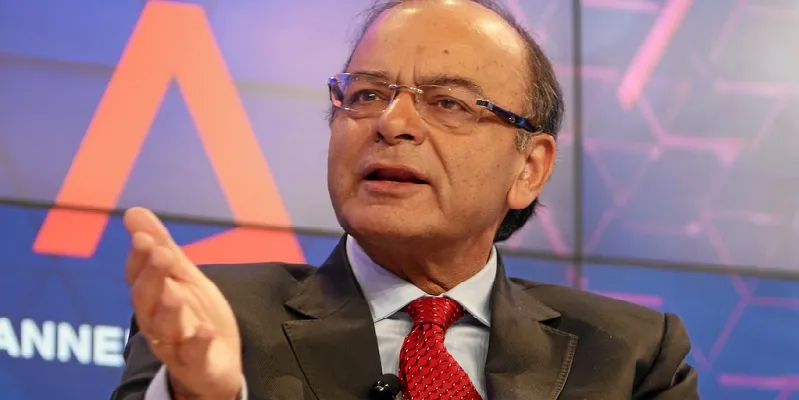Govt hustles in Finance Bill, makes Aadhaar a must for PAN, filing IT returns
Finance Minister Arun Jaitley raised the hackles of the opposition by including in the Finance Bill amendments that impacted nearly 40 laws including the Employees Provident Fund Act, Telecom Regulatory Authority of India Act, Companies Act, the Information Technology Act, Smuggling and Foreign Exchange Act, among others.
Finance Minister Arun Jaitley sought to push through nearly 40 amendments, including one related to making Aadhaar mandatory for getting a PAN card or filing income tax returns, as part of the Finance Bill, in the Lok Sabha today. The Finance Bill, being a money Bill, doesn't have to be passed by the Rajya Sabha.

Amid protests from the opposition, Jaitley said that by linking Aadhaar to income-tax returns, tax evasion and fraud will come down.
“As 98 percent of citizens have been issued Aadhaar cards, the unique 12-digit identity number with biometric details such as fingerprints and iris scans, those filing income tax can now fill in their Aadhaar card or at least the Aadhaar application number. This will cut down frauds as the I-T department has detected some cases where the same people have filed taxes by giving as many as five PAN cards. This move will reduce tax fraud and evasion,” he reasoned.
Aadhaar will be mandatory for PAN card application or filing income tax returns from July 1.
It may be recalled that the Supreme Court had, in an earlier judgement, said that Aadhaar would not be mandatory for availing Direct Benefit Transfer of domestic LPG subsidy or for any other government scheme; however, after this Bill has been passed by both houses, it will become law, superceding earlier judgements. Only the constitutional validity of such a move can be challenged.
The Lok Sabha passed the Finance Bill 2017 even as some parties walked out and others protested.
Linking Aadhaar to PAN and I-T returns is also a way to tighten rules governing cash transactions after demonetisation, according to Chetan Chandak, Head of Tax Research, H&R Block India. “It’s a very welcome move. It will reduce benami transactions and increase tax compliance,” he said.
In the Lok Sabha, Jaitley said that in the aftermath of the November 8 demonetisation, the I-T department had sent SMSes and emails to 18 lakh people whose accounts had seen deposits of more than Rs 2.5 lakh. Out of these, only 8.71 lakh responded, while the department had to initiate action against the rest.
The Aadhaar number has also been made mandatory for Employees Provident Fund account holders.
The opposition members pointed out that agriculture income, which is tax-free, was being computed to arrive at the final figure for those having agricultural as well as other incomes. When they demanded clarity, Jaitley stuck to his guns, and said there was no tax on farm income.
Amid walkout, protests
The Finance Bill 2017 came up for discussion in the Lok Sabha a day after Jaitley proposed 40 amendments, mostly pertaining to electoral reforms, sparking protests from regional parties such as the Biju Janata Dal (BJD) and the Trinamool Congress (TMC).
These parties also alleged that by tagging many important amendment Bills pertaining to laws such as the EPF Act, TRAI Act, Companies Act, Information Technology Act, Smuggling and Foreign Exchange Act to the Finance Bill, the government tried to bypass the Rajya Sabha, where it is not in majority.
On electoral reforms too, on which he had spoken during the Budget, Jaitley proposed making Aadhaar mandatory for filing of income tax returns, and spoke of allowing only cheque contributions to electoral trusts. The FM also capped the limit for cash transactions to Rs 2 lakh from April 1, down from the earlier proposed limit of Rs 3 lakh.
There was some cheer for senior citizens as Aadhaar was not been made mandatory for them for availing rail ticket concession, but the Railways has been creating a database of senior citizens from January this year. This process was voluntary, the Lok Sabha was told.
Poll reforms
Jaitley said the government would amend several laws, including the RBI Act and the Income Tax Act, to allow political parties to raise funds through electoral bonds. “Electoral bonds have been announced as a scheme for cleansing political money under the Income Tax Act. As the RBI will authorise a bank to issue electoral bonds, the RBI Act will also be amended,” he announced.
Chandak said that for every person with a PAN card, there were many with Aadhaar cards. So, the number of PAN applicants and holders was much less than the population that holds Aadhaar cards.
“This move will impact all transactions, as every monetary transaction will get tracked through Aadhaar. Those with multiple PAN numbers will be eliminated, and those in the lower income brackets who were not paying income tax and did not bother to apply for a PAN number are now forced to apply for one. Income reporting will become more accurate as computation of personal income will become better, being matched from many sources. They are building a chain to curb black money and tax evaders,” Chandak said.







